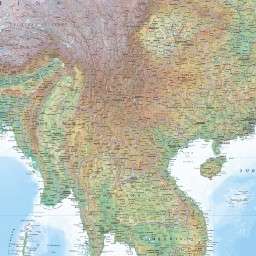
Travel Requirements to Southeast Asia
The Top 5 Travel Scams of South East Asia
When backpacking Southeast Asia, make sure you’re up to date on the Top 5 Travel Scams of South East Asia and how to avoid them. Learn about travel safety and how to protect yourself in Thailand, Cambodia, Vietnam and other countries!
Touts and scammers have always made me laugh. Not only because of their extremely illogical excuses to run away with your hard-earned money but also because of how soon they switch their bipolar personalities from “helpful local” to “go away, farang!*”.
Nevertheless, it saddens me to see the number of people who keeps falling prey to these con artists, especially those who (falsely) believe that they were contributing to a good cause.
Scam artists in Asia operate somewhat different to those in other parts of the world, mainly because of factors such as culture, language and tourist’s ignorance of how different things are in foreign developing countries.
For example, he scams found in Eastern Europe, on the other hand, often involve tourists being led by a beautiful female stranger to a bar with two different lists of prices and, once the bill arrives, they will soon find out that they are being charged 10 times the agreed amount and are not allowed to leave without paying.
On the other hand, the scams in Asia involve deeper logistics on the part of the scammers, making them harder to avoid. Here is a list of the Top 5 Travel Scams and how to avoid them (and in some cases, how to turn the tables on the scammer and obtain some freebies!).
Your Destination is Closed but I Know a Place…
This is by far THE most common scam in Thailand. There are many variations of this one, the simplest one involves a stationary taxi/tuktuk that is parked outside of hotels/hostels offering their service to the tourists.
Once you board them and tell them your destination, they will make up some excuse about how it is closed because of a “Buddhist Holiday” (note: there’s NO such thing as a Buddhist Holiday!) but luckily for you he knows another much more interesting place (that you have probably heard NOTHING about) and that he can take you there for an extremely low fee.
He will take you, alright…before stopping at three different souvenir shops from where he will obtain a voucher for petrol and a commission for everything you buy. Once you’re inside the shop, you will be coerced to visit each and every single section, from the obviously fake gem to the tacky trinkets that you can obtain outside for half the price.
In the end, you will have wasted an entire day of sightseeing and (in case you didn’t buy anything) you’ll be left stranded in the middle of a God-forsaken place by your “friendly” driver.
Another variable of this scam involves “Tourist Police” (basically an average Joe with a fake ID in Thai) outside of the Grand Palace. He will tell you the same story about how the palace is closed because of a “Buddhist Holiday” (seriously, do these scammers expect tourists to believe that instead of massive celebrations inside of the temples, Buddhist people are just chilling at home?) and “guide” you to his friend the friendly Tuk Tuk driver (read here to see how turn the Tuk Tuk driver into your ally. ).
How to Avoid it: Do your research of the public transportation available before you step out of your hotel/hostel. In Bangkok you can get to ALL tourist attractions by using a combination of the SkyTrain + Boat Services. In the case that you really need to use a taxi/tuktuk for sightseeing (which is believe is a must if you want to explore the Angkor Temples of Cambodia), my best advice is to book it through your hotel/hostel.
That way, even in the case that he insists of taking you to his friend’s souvenir store, you’ll have the security that he will indeed wait for you no matter what. After all, the driver is well aware that if he scams you, then you’ll report him to your hotel and he’ll never work again for them.
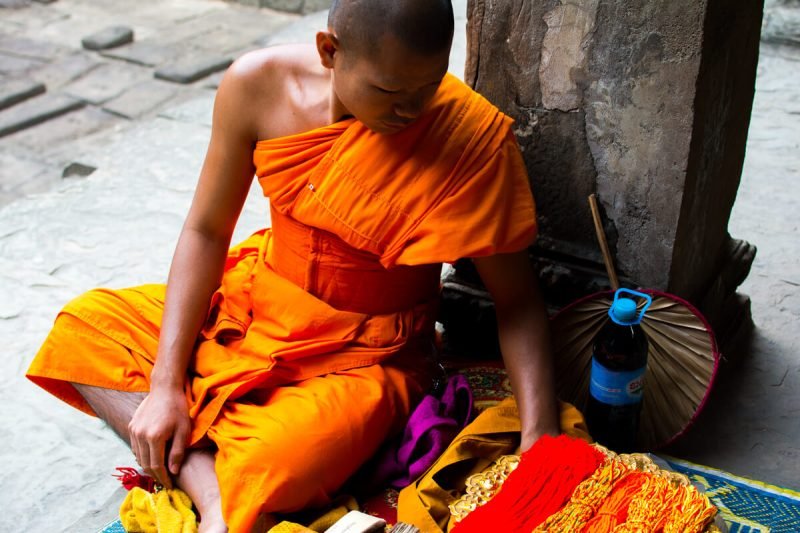
The soul of Angkor Wat in the eyes of a local
The Word of Mouth Scam
This one is very common in Chiang Mai and other small tourist towns. By far, this scam is the most well thought of them all since it involves an extensive network of sleeper agents. As you walk in the city, you’ll be approached by a friendly local who (surprisingly) doesn’t attempt to sell you anything and actually helps you by suggesting legit places to visit.
During the course of the friendly exchange, he/she will mention in passing that you have a good style and there’s a very reliable tailor shop in the city.
He will NOT take you there, rather, he’ll just go on his/her own way, giving the impression that this is actually a local who isn’t trying to make a commission at all.
Eventually, you will encounter more and more local persons who mention the name of the tailor shop and, like in a good Christopher Nolan movie, the name will get “inceptioned” in your mind and you’ll visit the tailor shop. Inside, you will probably find other tourists like you that are being measured for custom dresses and suits.
Once inside, the owner will show you a catalog of nice fabrics and designs, while you take a look at them, you’ll be asked your departure date from the city and it will conveniently be “too late” for them to finish the dress/suit BUT if you pay 50% in advance they will put all of their other works on hold and finish yours with the highest priority. Pressured, you’ll cave in.
Finally, when you return to pick it up in your last day, you will obtain a supbar item, made of polyester instead of silk and with a very bad fit, almost as if it was made in a wholesale factory (and trust me, it probably was). Angry, you will remand your refund back. You’ll never get it. Instead, you’ll be forced to pay the remaining amount or else the owner will call the local police (who are in on the scam and are probably loyal costumers of the shop).
How to avoid it: Ask yourself “did I travel all the way to South East Asia to get a suit/dress?” If the answer is yes, then do your own web research to find a reliable tailor with good reviews from foreigner people.
If the answer is no, then do not, I repeat, do not fall into the high-pressure sales tactics of these people who insist that this is a “once in a lifetime opportunity”. The local police will always side with the locals in South East Asian countries, probably because of the fact that they’ll gain a good percentage of the scam.
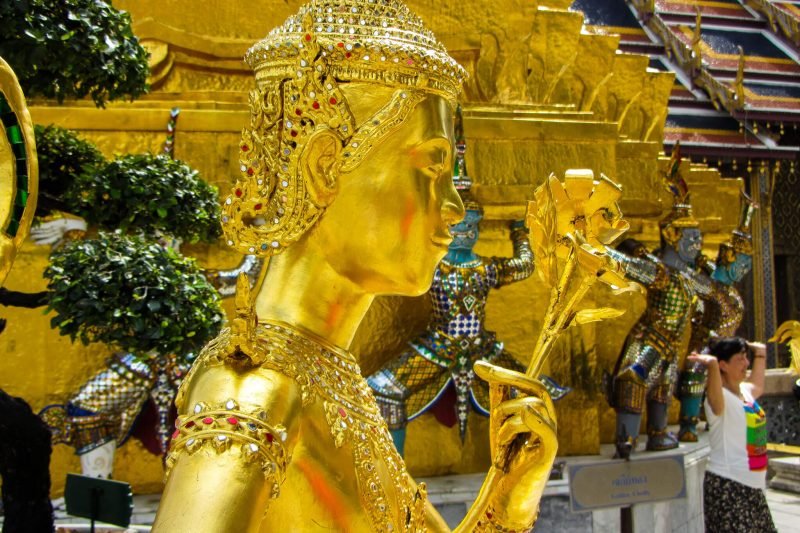
Inside the Royal Palace of Bangkok
The Cambodian Charity
This is becoming extremely common in Siem Reap (check out alternative things to do in Siem Reap), Cambodia (or should I say Scambodia?). The beauty of this scam is that, from all intents and purposes it looks extremely legit and (unless you know about it beforehand) it is extremely cruel not to fall in it.
The scam involves a little kid begging for milk powder for his/her little brother/sister in arms. They will then lead the tourist into an overpriced store where they will buy expensive milk powder and give it to the child. Afterwards, they will wait for the tourist to leave and re-sell the item to the store owner, receiving a (very) small commission for their efforts.
Variable of this includes visits to schools in floating villages that end with you being encouraged to buy extremely overpriced rice/notebooks as well as to make monetary donations to them. While most people believe that they are indeed helping the local community, the sad truth is that the money goes directly to the local mafia.
How to avoid it: Firmly state that you have no money to spare and leave it at that. Yes, I know it is heart wrenching to witness these kids begging for you to buy them milk powder but if you really want to help them, offer to buy them a meal or a bottle of water.
Do not encourage these bad practices that only serve to enrich the mobster and make things harder and harder for these kids. Also, do not attempt to discourage other tourists from contributing since you will get into a lot of trouble from the locals, my best advice is for you to spread the word of this scam in your hotel/hostel instead of attempting to do so in the open.
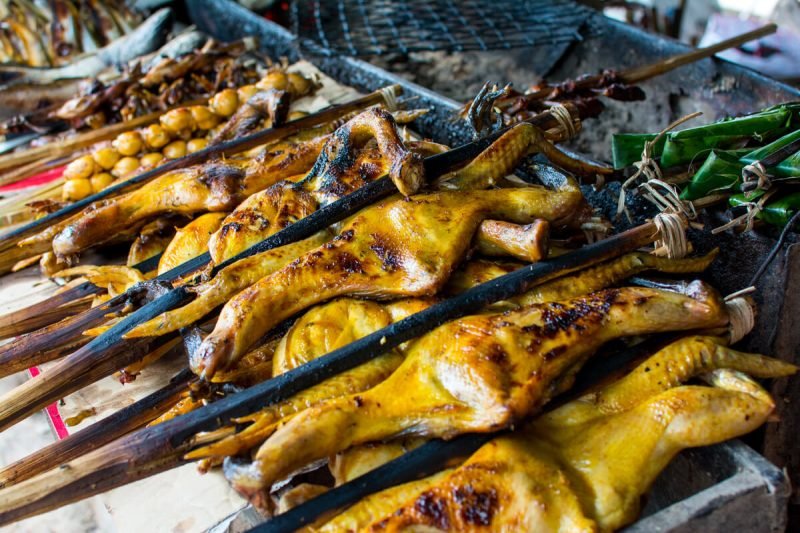
A taste of real Cambodian food
Mispronounced Fixed Fares
So far, I have only encountered this scam in Beijing, China but I have heard many stories of this happening everywhere in South East Asia as well. It basically involves a taxi/tuk tuk driver with limited English skills (whether they are pretending or not is irrelevant) that give you a fixed price only for them to claim afterward that a) the price was in USD, not the local currency or b) what you heard as fifteen was actually fifty.
As a rule of thumb, I never agree to fixed fares on taxis since the taximeter is the most honest way for both the driver and the costumer. However, there are some cases (such as Beijing’s rush hour) where hailing a cab on the street is impossible so you have to take a stationary taxi (with a fixed price) no matter what. It is also necessary to agree to a fare for excursions outside of the city center, such as the one to the Great Wall at Mutianyu.
How to avoid it: Always write down everything. Always. And add the local currency symbol/name to make things clearer. I made the mistake of not doing this when taking a cab back to my hotel after a performance of Beijing’s Opera.
Luckily (or maybe not) for me, it was very late in the night so there were no police/transit in the area so when the taxi driver confronted me demanding 50 yuan I just gave him 15 (as we agreed on) and made a run for it. He never chased me. And yes, I am aware that this could have gotten me in trouble if it wasn’t for the fact that there no witnesses in the area. I guess I just got lucky.
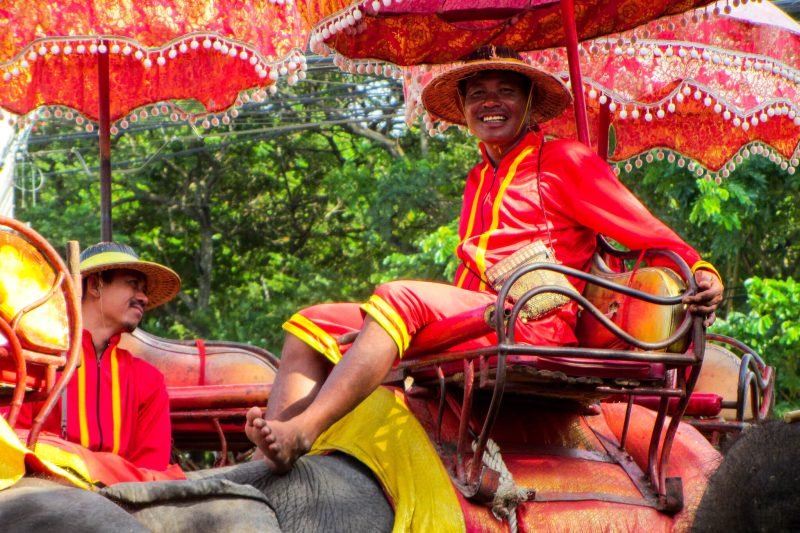
The Elephant Mahouts of Ayutayah
This Shop Belongs to the Descendants of…
This one is extremely common in India and it involves tour guides/drivers in Agra, home of the Taj Mahal, taking you to the shop of one of the descendants of the artists that decorated the marble structures of the Taj. Once inside, you’ll be treated like a king with free soft drinks and/or coffee and tea.
After a demonstration on how they create their masterpieces in marble soapstone, they’ll start to give you a tour of each and every section and claiming that you don’t have to worry since they’ll deliver your purchase to your home, shipping fees included in the price.
While I do not doubt that they’ll keep their word, the thing is, these are NOT the descendants of the artists of the Taj Mahal and mainly, there is a very little chance that all of the articles are made of pure marble. There is a variable of this scam at the Giza Pyramids of Egypt in which your guide will take you to the Papyrus Museum, which is actually a plain ol’ shop. At least the owner didn’t claim to be descendent from the Pharaohs themselves.
How to Avoid it: Take out a coin and attempt to perform the classic marble test. If they panic because you’ll scratch the marble (actually, soapstone) then you can just call it a day and leave the shop. If you do not buy anything, there is a chance that they will attempt to charge you for the free drinks they gave you.
If this happens you have basically three options: Either seek assistance from your guide/driver, threaten to call the police or publicly shame them in front of their fellow employees by saying how they’ll receive a lot of bad karma because of their actions. Either way, they cannot and will not force you to pay what they offered for free.
Other common places where it happens is in most SE Asia’s capitals (such as Yangon) each time you visit a high-end souvenir shop. At some point, I really wonder if the owners themselves BELIEVE that they are direct descendants of the dudes that build their countries’ most famous pagodas and temples!
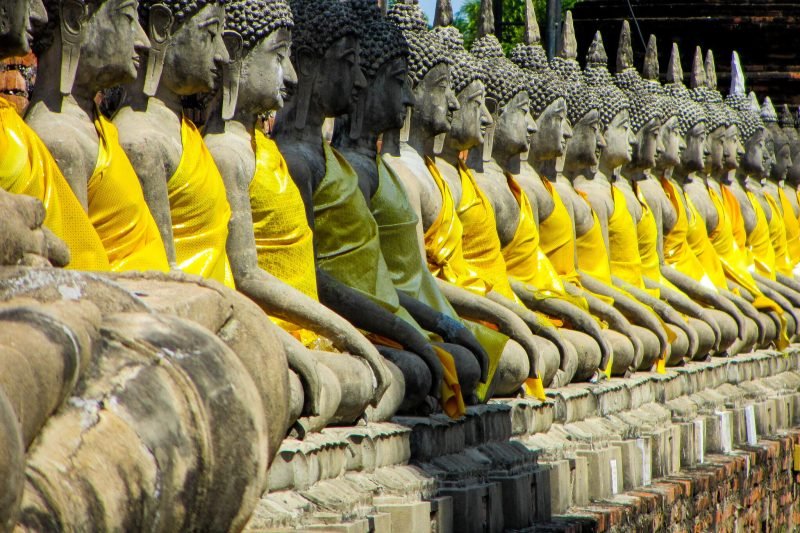
A day trip to Ayutayah, Old Capital of Siam
Don’t Forget to Pack Your Common Sense
“Don’t forget to pack your common sense” is one of the most clichéd advises ever given and yet, it is entirely true. When backpacking in South East Asia, it is not uncommon to be approached by a local stranger on the street. However, the first thing you should ask yourself is “why is this stranger talking to ME?”.
I mean, would YOU approach a foreigner in your country without any reasonable motive whatsoever? Every single time a local approaches you to practice his/her English in the middle of the street, be aware because it is most likely a scam.
Never agree to enter secluded places such as tea houses or bars with locals that you met on the street and if you are keen on doing it, choose the location yourself to see how they turn the tables and insist beg that you come with them to the place of the scam, where you will be overcharged and they’ll get a hefty commission.
When traveling by train, never believe anyone who approaches you saying that your train has already left. This is extremely common in India where local people in official-looking uniforms with fake badges claim to be employees of the Railway Station and offer you an alternative way to reach your destination: their taxis.
Trust no one but your gut.
Last but not least, don’t forget to use our Booking.com Affiliate Link of Wonders for making hotel reservations.
Same price for you and a small pocket money commission for this website of yours.
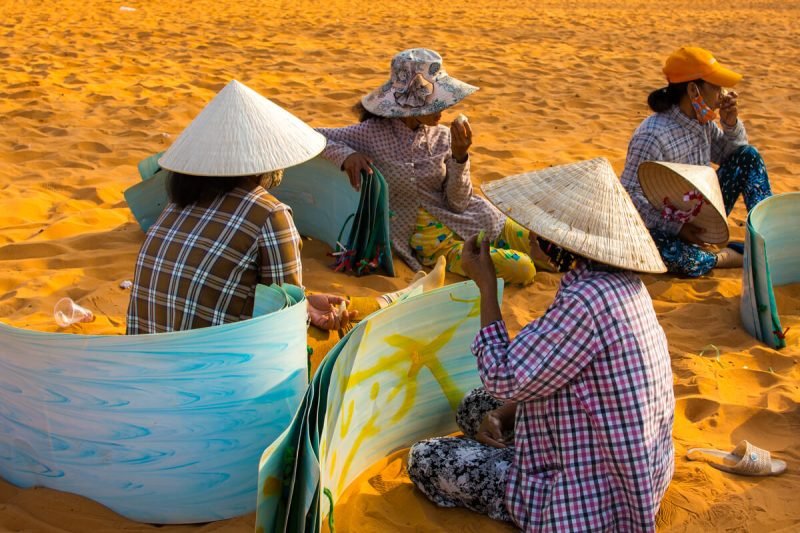
The locals of Mui Ne, Vietnam
I hope these five advises have helped you in your travels and, by all means, don’t be discouraged by all the stories you might heard about the dangers of traveling to Third-World Countries.
Trust me, the amount of good-hearted people far outweighs the number of scammers that prey on tourists. Have you ever been scammed? Hit the comments section down below and share your experience.
Until next time, my friends.
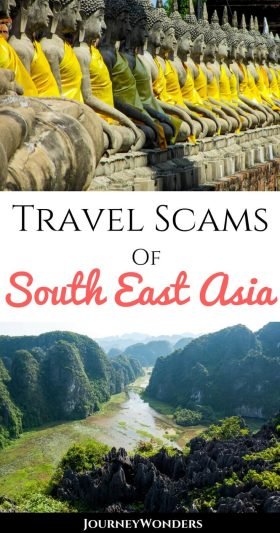
Pin to Pinterest?
Travel Requirements to Southeast Asia
The information provided below has been updated on 30th March 2021 regarding pandemic regulations in Southeast Asia. These regulations are not constant and are subject to change frequently. Thus it is important to stay up to date with the travel restrictions in these countries from their official websites.
Since the outbreak of the coronavirus, countries all around the world have taken cautious measures to contain the spread of the virus by implementing a number of restrictions and regulations. In Southeast Asia, the pandemic regulations in each country are different and they continue to change with the number of cases they have in a month, or even within a week.
Singapore
Singapore has been proactive in their handling of the pandemic. A number of strict procedures have been put in place in order to regulate the flow of people in and out of the country
without increasing the risk of COVID-19. If you are planning to do an internship in Singapore, it is imperative to be informed of the latest visa requirements and travel arrangements.
People who have recently travelled to Italy, France, Germany, mainland China, South Korea and Iran will not be allowed to enter or transit through Singapore. And Singaporeans who have travelled to the countries mentioned above within the last 14 days will be allowed in with a stay-home notice.

Figure 1. Marina Bay Sands, Singapore (Source: Pexels)
The type of visa required for an applicant to complete their internship in Singapore is called the Work Holiday Permit (WHP) . To apply for a WHP, candidates must first submit an application to the sponsor company. The host company must then have the application issued by relevant government agencies in Singapore and get a notification letter. The final step is to register the fingerprints of the candidate to receive the WHP.
If you already have a WHP, you must meet the following additional requirements for COVID precautionary measures if:
- You are a Malaysian citizen or holding a Malaysian PRs, entering by land or staying in Singapore for at least 90 days for work purposes, companies can bring the passenger in under the PCA scheme
- A WHP holder entering Singapore from the Reciprocal Green Lane (RGL) counterpart countries/regions and staying for up to 14 days, companies or government agencies can bring the passenger through the RGL
- All other WHP holders, including those on IPA, must get entry approval from the Ministry of Manpower (MoM)
To request approval from MoM:
- Pay for a COVID test 72hrs before travelling and stay at the dedicated SHN facility
- Use the entry approval calculator from MoM to apply for MoM’s entry approval
- Ensure there are available flights and you can travel to Singapore on the set date before requesting MoM’s entry approval
- Request for MoM’s entry approval
- Wait for the approval. Once approved, confirm your flights immediately and make arrangements to enter Singapore
The situation in Singapore is constantly changing and therefore the information above is also going to be different, if not on a daily basis, then on a monthly basis. Therefore, it is important that you visit the website of the Ministry of Foreign Affairs Singapore for the latest developments and updates on travel restrictions to Singapore.
Vietnam
Vietnam has imposed more rigorous restrictions in the country after confirming 2,329 positive cases of COVID-19 with 35 deaths as of February 18, 2021. To date, no entry is granted to tourists. The only exceptions are Vietnamese citizens, diplomats, officials, foreign investors, experts, skilled workers and foreign students.

Figure 2. Farmer in the paddy fields (Source: Pexels)
If you are planning to do an internship in Vietnam, you can refer to the list below. The government has placed additional requirements for travellers to obtain a visa and be allowed into the country. The first step is to have a sponsor company/institution located in Vietnam and for them to get the entry permit issued by the Vietnamese Immigration Department. To obtain the entry permit, the company/institution in Vietnam have to prepare the following documents:
- Form NA2 issued together with Circular No. 04/2015/ TT-BCA for foreigners. The company can also access and complete these documents online, print them, sign and seal them.
- A copy of a valid Vietnam visa or a Temporary Residence Card (TRC), if any and note it on the Request Form NA2. Original or certified copy of the Written Approval by the Provincial People’s Committee, allowing foreigners to enter Vietnam to carry out their employment, family members visit, study, and approving their transport and quarantine plans.
- Original or certified copy of the Written Approval for quarantine issued by the People’s Committee of the Province where the quarantine is taking place in case it is different from the Province mentioned in item 3.
- Flight details if entering Vietnam via the airport. The details must include flight number, itinerary and arrival airport. If this information is not readily available, please contact the Immigration Department immediately when they are available.
- If this is the first time applying for an entry permit to Vietnam, the following documents must be included: Certificate of Business Registration Certificate or Decision on Company Establishment issued by the competent authority and Form NA16- A registered form of seal and signature of the legal representative of the enterprise operating in Vietnam
After preparing all the required documents, the sponsor company/institution can submit them to the Vietnam Immigration Department. The processing time will take 3-working days. After approval, it is advised that the required arrangement will be prepared by the host company in Vietnam like vehicles and hotels for quarantine.
Thailand
Due to the decrease in the number of cases in the country, Thailand will be reducing the length for quarantine to 10 days starting 1 April 2021. After completing the quarantine period, you are free to travel around the country.
Right now, the only passengers allowed to travel to the country are Thai citizens, persons invited by the Prime Minister, the spouse, parents or children of a Thai national, foreign nationals holding a valid work permit or a valid certificate of residence, foreign nationals who are students at an educational institute approved by Thai authorities, holders of “Special Tourist Visa” and of a non-immigrant visa who are business people without a work permit.

Figure 3. Temple in Thailand (Source: Pexels)
Before travelling to Thailand, you must complete the health declaration form, and Thai nationals must complete:
- Certificate of Entry (COE) issued by the Thailand Ministry of Foreign Affairs
- A Fit to Fly certificate issued within 72 hrs prior to departure
- A 14-day hotel booking confirmation at an approved Alternative State Quarantine (ASQ) hotel.
If you are planning to do an internship in Thailand, foreign nationals must also complete the COE and get a Fit to Fly certificate issued within 72 hrs before departure. Non-Thai nationals must have with them a medical certificate that indicates a negative COVID-19 test within 72 hrs before departure. Passengers must also have travel and health insurance in the amount of USD 100,000, hotel confirmation for 14 days at an approved ASQ and a valid visa.
Currently, there are three visa types being provided by the Thai government to foreign nationals:
- Special Tourist Visa (STV) : This visa was implemented by the Thai government in September 2020 to allow for a limited return of long-stay tourists. On 8 December 2020, it was further adapted to allow more people to travel to Thailand, including from the UK and Ireland. With this visa, people are allowed to stay for 90 days in the country. Tourists are able to extend it twice at 90 days each while in Thailand.
- Tourist Visa (TR) : With this visa, tourists are allowed to stay up to 60 days in the country. This new agreement was issued at the beginning of December 2020.
- Visa Exemption : In mid-December, 2020, Thai authorities agreed on a scheme that allowed tourists to travel to Thailand under the visa exemption scheme. This visa usually allows passport holders from certain countries like the UK to stay for 30 days. However, now this has been extended to 45 days and allows an extra 15 days to cover the mandatory quarantine period.
The Thai government has estimated that by October 2021, there will be no need for any mandatory quarantine when entering the country.
Indonesia
The government has taken multiple measures to contain the virus; from quarantine measures within the country to travel restrictions of tourists to Indonesia. Now with the wide distribution of the vaccine in the country, more people have been vaccinated with as many as 5,567,280 people being vaccinated as of 22 March 2021. Because of this, travel restrictions have been partially lifted. Foreign nationals are now allowed to travel to Indonesia if they have the following visa types :
- Official Visa
- Diplomatic/Service visa
- Official Residence visa
- Diplomatic Residence Permit
- Temporary Stay Permit (ITAS)
- Permanent Stay Permit (ITAP)
- E-visit visa with a visa number ending with LN
- Asia-Pacific Economic Cooperation (APEC) card
Only Single Entry visas are allowed right now and all categories under ITAS are open. Please note that a work permit for the Work ITAS is required by the Ministry of Manpower (MoM). If there is a specific bilateral travel corridor arrangement (BCA) between Indonesia and the foreign country you are flying from, then you may follow the rules set in this BCA.

Figure 4. Indonesia (Source: Pexels)
Upon entry, passengers are required to undergo a 5-day self-imposed quarantine . All passengers must also have a medical certificate indicating a negative result of the COVID-19 PCR test result. The test must be taken within 72 hrs before departure. Travellers must also complete a health declaration form before their arrival in Indonesia. If you are planning to complete an internship in Indonesia, please refer to the Indonesian immigration website for specific information regarding updates on internship/student visas.
For more information on the specific documents required and procedures to travel to Indonesia from your country of residence, please contact your embassy or consulate.
Malaysia
In response to the pandemic, the Malaysian government implemented the Movement Control Order (MCO) based on the country’s pandemic situation. A Conditional MCO was implemented until 18 March 2021 in nine places in the country and Recovery MCO in seven other places in Malaysia until 18 March 2021.
Foreigners are still prohibited from entering the country until 31st March 2021. The only exceptions are those holding the following visas and permits:
- Foreigners on the Long Term Social Visa Pass (LTVS) list and those who hold an approval letter from the Malaysian Department of Immigration or a Malaysian Consulate overseas.
- Permanent Residence (PR)
- Diplomats and dependant on foreign missions in Malaysia
- Long term spouse Visa Pass and dependant
- Employment Pass (Category 1), Dependants and Maid
- Resident Pass- Talent & Dependant and Maid
- Seafarers
The Long Term Social Visit Pass is issued to a foreigner who wishes to stay in Malaysia temporarily for a period of not less than 6 months. Extensions of the period of stay can be given based on the eligibility criteria and under certain conditions.
The Malaysian government has also suspended new visa applications for Chinese nationals and foreign nationalities who have visited Hubei, Zhejiang or Jiangsu Provinces in the last 14 days.
If you hold one of the visa types mentioned above, you are eligible to enter and complete an internship in Malaysia.
Once permitted into the country, Malaysian citizens and foreigners must observe a 10-day quarantine at a designated location set up by the government upon arrival. Passengers have to pay for the cost of the quarantine requirements.
The moment passengers arrive in Malaysia, they are required to take a COVID-19 test. This test will be conducted at the Health Inspection and Screening International Gate (PMA) at Kuala Lumpur (KUL) airport. Passengers will bear the cost of the COVID-19 tests done at the PMA.
This information is meant to help and aid you to be informed of the latest updates on travel regulations and restrictions to the destinations we provide internships in. As mentioned before, all the information provided above is subject to change and so it is imperative that you check for the latest updates from the official government websites of the respective countries.

Figure 5. Travel documents and devices (Source: Pexels)
Now it’s time to apply to AIP!
Now that you are up to date with the visa requirements and travel restrictions to the SEA destinations, you can start your internship journey with AIP in the near future! AIP provides internships that help a student grow professionally and also exposes them to diverse cultures.
By starting an internship with us, you have a chance of improving your professional skills and experiencing a diverse culture in the country of your choosing. These skills will benefit you in your professional and personal life for a long time.
The aim of AIP is to ensure students, who complete an internship with us, have an all-around learning experience and self-growth during their time interning with AIP. For more information, visit our website and stay updated on our programs and packages!
COVID-19 Travel Restrictions in Southeast Asia

What is the situation like with COVID-19 in Southeast Asia? Like you, we are desperate to hitch on that backpack and set off for adventures – but is that possible right now?
We strive to regularly update this article with the latest travel restrictions across Southeast Asia to keep you up to date with where you can and can’t travel, and what entry requirements are in place (quarantine, PCR tests, mask-wearing etc.).
Where can you travel in Southeast Asia? – Quick Answers
Click the country to skip down for more details.
- Cambodia – Mandatory quarantine is no longer required regardless of vaccination status (unvaccinated travellers must take rapid antigen tests on arrival).
- Indonesia – Open to fully vaccinated tourists, quarantine-free. Unvaccinated travellers have to fulfil a mandatory quarantine for 5 days if entry is permitted. Unvaccinated travellers need to provide a negative test 48 hours before arrival and a letter from an approved Government hospital proving they are exempt from the vaccine.
- Laos – Fully reopened to international tourists, quarantine-free.
- Malaysia – Open to all travellers regardless of vaccination status from August 1, 2022.
- Maldives – Open to tourists regardless of vaccination status; quarantine free.
- Myanmar – Open to international fully vaccinated international travellers only.
- Philippines – Open to fully vaccinated international tourists with no quarantine. Unvaccinated travellers are required to apply for a visa and a travel exemption prior to entry.
- Singapore – Open to fully vaccinated international tourists. Unvaccinated tourists are allowed to enter from 29 August with a negative covid-19 test for short-term stays.
- Sri Lanka – Open to tourists, no quarantine for vaccinated or unvaccinated travellers is required. Unvaccinated travellers will need to take a test on arrival.
- Thailand – Open to international travellers. Fully vaccinated tourists and unvaccinated tourists who present a negative COVID test do not have to quarantine. Unvaccinated travellers without a test can enter the Happy Quarantine Scheme.
- Vietnam – Reopened to international tourists (vaccinated and unvaccinated) without quarantine or testing.
COVID-19 Travel Restrictions Southeast Asia (Countries A-Z)
Disclaimer: COVID-19 travel restrictions are changing every day and the following information reflects South East Asia’s Backpacker’s understanding of the current rules for entry. While we update this article regularly to ensure the information is as current as it can be, we cannot be held responsible for any errors or omissions.

SafetyWing Nomad Insurance
SafetyWing is the travel insurance of choice for scores of backpackers!
- Subscription style insurance
- Offers COVID-19 cover
- Available after your trip has started
Cambodia Travel Restrictions
- Open to international travellers: Cambodia is open to international travellers.
- Visa on arrival: Available.
- Requirements upon arrival: Unvaccinated travellers must take a rapid antigen test upon arrival at their own expense.
- Current internal travel restrictions: Many hotels, public businesses and tourist attractions have been forced to close due to a lack of custom. Extra restrictions could be introduced at short notice.
- Face coverings: Masks are not compulsory but are recommended in all public places.
- Border crossings: All land borders with Thailand, Cambodia and Vietnam are now open.
Indonesia Travel Restrictions
- Open to international travellers: Indonesia is open to fully-vaccinated international travellers.
- Visa on arrival: Available.
- Requirements before departure: Provide proof of vaccination status. No PCR test is required unless requested on arrival at the airport (body temp over 37.5°C) at the health checkpoint.
- Quarantine: No quarantine is required for fully vaccinated international arrivals. However, unvaccinated and partially vaccinated travellers will need to quarantine for 5 days if permission to enter is approved.
- Current internal travel restrictions: There may still be restrictions on travel and social activity in some regions.
- Face coverings: Masks are recommended in public places (indoor).
- Border crossings: The land border crossing into Borneo Malaysia is currently closed.
Laos Travel Restrictions
- Open to international travellers: Laos reopened to international travellers on May 9th 2022.
- Visa on arrival: Available. E-visas are also available.
- Requirements before departure: If you are fully vaccinated you must show proof of your vaccination certificate. Partially and unvaccinated travellers (over the age of 12) will need to provide proof of a negative test result taken no earlier than 48 hours before their departure.
- Quarantine: There is no longer a quarantine requirement for travellers entering Laos.
- Current internal travel restrictions: Travel restrictions vary, however, they have been mostly scrapped.
- Face coverings: Masks are advisable in all public places.
- Border crossings: Land borders are now open. If you plan to cross into Thailand by land, you must apply for permission in advance.
FOR MORE IN-DEPTH INFO: COVID-19 Laos Travel Restrictions.
Malaysia Travel Restrictions
- Open to international travellers: Malaysia reopened to all international travellers regardless of vaccination status on 1st August 2022.
- Visa on arrival: Not available.
- Requirements before departure: Arrange visa, download the MySejahtera app and book a return flight.
- Quarantine: All previous Covid-19 travel restrictions have now been removed including mandatory vaccinations and quarantine.
- Current internal travel restrictions: Travel restrictions vary depending on the province.
- Face coverings: Masks are required for public transport and medical facilities only but are still recommended indoors.
- Border crossings: Crossing the border into Thailand (Peninsular Malaysia) at certain crossings is now allowed. Crossing into Indonesia (Borneo) is not permitted. The land border between Malaysia and Singapore is open without testing requirements.
FOR MORE IN-DEPTH INFO: COVID-19 Malaysia Travel Restrictions.
Maldives Travel Restrictions
- Open to international travellers: Yes.
- Visa on arrival: Yes. Travellers from most nations can receive a free 30-day entry pass on arrival.
- Requirements before departure: Must complete a Traveller Health Declaration Form 72 hours prior to arrival.
- Quarantine: Tourists do not need to quarantine when entering the Maldives.
- Current internal travel restrictions: Travel between the islands of the Maldives is not restricted.
- Face coverings: Face masks are advised to be worn in all busy public places in the Maldives, however, these are no longer compulsory.
FOR MORE IN-DEPTH INFO: COVID-19 Maldives Travel Restrictions.
Myanmar Travel Restrictions
- Open to international travellers: Open to fully vaccinated tourists.
- Visa on arrival: Not available. Apply for a visa online.
- Requirements before departure: You’ll need a valid visa, proof of vaccination status (printed certificate), negative pre-departure test result, insurance, health declaration form and COVID-19 Rapid Test Requisition form.
- Quarantine: Fully vaccinated business travellers no longer need to officially complete a quarantine, however, they will have to quarantine in a hotel room until they receive a negative result from their arrival test. Unvaccinated arrivals will need to quarantine for 5 days.
- Current internal travel restrictions: Travel restrictions vary from state to state.
- Face coverings: Masks are compulsory in all public places and those disobeying the rule will be fined.
- Border crossings: The land border crossing into Thailand is closed.
FOR MORE IN-DEPTH INFO: COVID-19 Myanmar Travel Restrictions.
The Philippines Travel Restrictions
- Open to international travellers: Fully vaccinated travellers are allowed to enter the Philippines.
- Visa on arrival: Many nationalities can enter visa-free.
- Requirements before departure: According to the Press release of the Bureau of Immigration in the Philippines, COVID testing requirements have been lifted, but only for fully vaccinated travellers with at least one booster shot.
- Quarantine: For fully vaccinated travellers, there is no longer a mandatory quarantine.
- Current internal travel restrictions: There are restrictions on travel and the opening of public places which vary by region.
- Face coverings: Face masks should be worn in all indoor places and on public transport, including jeepneys and taxis.
FOR MORE IN-DEPTH INFO: COVID-19 Philippines Travel Restrictions.
Singapore Travel Restrictions
- Open to international travellers: Yes, fully vaccinated travellers are allowed to enter Singapore. Unvaccinated travellers can enter from 29 August 2022 with a negative covid-19 test for short term stays.
- Visa on arrival: Many nationalities can enter visa-free.
- Requirements before departure: Get proof of vaccination status, complete an online SG Arrival Card (3 days before arrival). Travel insurance is compulsory and must cover COVID-19.
- Quarantine: Fully vaccinated travellers no longer have to quarantine. Other travellers will be required to quarantine for 7 days.
- Face coverings: Masks mandates are easing for all indoor settings except for hospital/medical facilities and public transport.
- Current internal travel restrictions: Must be fully vaccinated to eat out and attend events of over 500 people.
- Border crossings: Land border with Malaysia is open.
FOR MORE IN-DEPTH INFO: COVID-19 Singapore Travel Restrictions.
Sri Lanka Travel Restrictions
- Open to international travellers: Yes. Sri Lanka is open to international travellers with valid tourist visas.
- Visa on arrival: Available. However, you are recommended to apply for a tourist visa online.
- Requirements before departure: Arrange a visa in advance, show a negative COVID-19 PCR/RT test within 72/48 hours of your flight (unvaccinated only), provide proof of vaccination status and purchase and pay for travel insurance online before travelling.
- Quarantine: No quarantine in place.
- Current internal travel restrictions: There are currently restrictions on inter-provincial travel for all citizens.
- Face coverings: Masks are compulsory in all public places.
FOR MORE IN-DEPTH INFO: COVID-19 Sri Lanka Travel Restrictions.
Thailand Travel Restrictions
- Open to international travellers: Yes. Thailand is open to travellers from all over the world.
- Visa on arrival: Available.
- Requirements before departure: Proof of vaccination or a negative test result within 72 hours of arrival in the country.
- Quarantine: Fully vaccinated travellers do not have to quarantine. From 1st May 2022, unvaccinated travellers who can provide proof of a pre-travel negative test result won’t need to quarantine either. Those who don’t present a test result will be required to quarantine for 5 days.
- Face coverings: Masks are recommended in all indoor public spaces and on public transport in Thailand.
- Current internal travel restrictions: Many hotels, public businesses and tourist attractions have been forced to close due to a lack of custom. Temperature checks are commonplace in hospitality venues.
- Border crossings: Some border checkpoints in Malaysia and Cambodia are now open. The land border with Laos is also open. You can’t currently cross the border into Myanmar.
FOR MORE IN-DEPTH INFO: COVID-19 Thailand Travel Restrictions.
Vietnam Travel Restrictions
- Open to international travellers: Vietnam is open to all international travellers regardless of vaccination status.
- Visa on arrival: Now available for some travellers.
- Requirements before departure: Obtain a visa online (if applicable).
- Current internal travel restrictions: Regulations vary in each province. Many hotels, public businesses and tourist attractions have been forced to close due to a lack of custom.
- Face coverings: Masks are compulsory in all public places in Vietnam and those not adhering to the rule can be fined.
- Border crossings: Most land borders into Vietnam are closed. However, the Vietnam-Laos land border is now open again.
FOR MORE IN-DEPTH INFO: COVID-19 Vietnam Travel Restrictions.

Nikki Scott | Founder & Editor
Nikki is the founding editor of South East Asia Backpacker and The Backpacker Network. In her early twenties, she left her home in the North of England on a solo backpacking adventure and never returned! After six months on the road, she founded a print magazine that became legendary on the Banana Pancake Trail. The rest is history.
Find me: Facebook | Twitter | Instagram
Join Over 20,000 Happy Backpackers in Our Facebook Group!
Find travel buddies. Get advice. Have all your questions answered by travellers on the ground in Southeast Asia right now.
Related Posts

How to Travel With Prescription Medication – What You Need to Know

COVID-19: Philippines Travel Updates

COVID-19: Thailand Travel Updates
19 thoughts on “COVID-19 Travel Restrictions in Southeast Asia”
Don’t know why ya don’t have South Korea in here. It’s East Asian. South Korea’s different from North Korea, ya know…..
Hi Kristy. This page is about travel restrictions for countries in Southeast Asia, not East Asia. North Korea isn’t discussed on this page either, for the same reason.
Hey! I’m planning a trip to Bali in the summer, but flights from London inevitably have long layovers in either KL or Singapore, and most also involve going through immigration, collecting your bags, and then checking in again for the onward flight.
My question is – how do the PCR tests work in this case? On my inbound flight, could I arguably go into KL or Singapore without invalidating my PCR test for Bali? (As long as it’s still in the 48 hour window.) Similarly, how would this work on the way back? I presume I would need to get a PCR test done in Bali to enter KL or Singapore? Or are there any free travel zones? If I do need a PCR test in Bali, do you know how easy it is to do this?
Thanks for your comment. I’m not entirely sure how it would work to be honest. Back to Bali is a great resource and may be able to give you some guidance as to how it would work. If not, an official office such as the embassy or consulate will be able to advise. I believe tests are pretty easy to get in Bali, you can ask the staff at your hotel how to go about this.
Thank you for updating this page regularly! It is very informative. We are a family with kids, hoping to do a visit to an Asian country July and August this year. We are following the re opening closely. What is your impression of which countries has less strict rules on wearing of face mask in public? I am concerned if the kids will manage to use masks continuously in the heat. They are not used to either. It might put some extra stress to their Holliday.
Regards, Celia
To be honest, it is very difficult to know what travel will look like in a few months! The face mask rules which exist now may not be the same. At present, nearly all Asian countries are very strict with masks. I’d recommend asking this question in our Facebook group: https://www.facebook.com/groups/SEABackpackerCommunity/. That way, you can hear from travellers on the ground at the moment.
I am curious on the verbiage. When you say Visas on arrival: None, does that mean it needs to be had in advance prior to entry? I apologise if this makes more sense than I get it, but I appreciate your help.
Hi Nhu! Yes, that is exactly right. Unless VOA is available, all visas will need to be applied for in advance.
Hi, thanks for the updates. Do you know if there is a plan to open the land borders between Vietnam, Thailand, Laos and Cambodia? Thanks
There are plans to reopen the land borders in the near future but as always, these things can change! Singapore has already implemented a land VTL which has enabled the Malaysia-Singapore land border to reopen. Keep an eye on the news for the latest developments and feel free to ask travellers on the ground in our Facebook Community. https://www.facebook.com/groups/SEABackpackerCommunity/
Hi Nikki
Thankyou for this so helpful!
We are going to the Philippines on the 5th of April and after 30 days we will be heading for Cambodia. I have two questions
Do you know what the entry requirements are when coming from the Philippines?
Also are you allowed to fly within the Philippines, for example from Manila to Coron etc?
Hi Mia,
1. The entry requirements, as far as I can tell, are the same if you are flying in from the Philippines to Cambodia as if you are flying there from anywhere else in the world. There are no special requirements for travellers coming from the Philippines. (Please check with a Cambodian Embassy to be sure.)
2. Yes. Domestic flights have been running in the Philippines for a while now, plus international travel opened on 10th February so things will hopefully be a lot easier for travellers!
Hope that helps. Have a great trip!
Hi there,
I’m Australian with extended family in SEA that I’ve not seen in 2 years because of this damn covid. I’ve just stumbled across this site and it’s proving helpful and informative. I will monitor this site for updates.
Thanks
Ferdi
Hello I have booked a 30 day tour (15 days in Thailand and 15 days in Vietnam) starting April 30th 2022 – I was then planning on spending a couple of months in Cambodia, Laos and Northern Thailand before heading to Bali in September time!
Do you think by then things will have settled a bit more/that will be feasible?
At the moment, it’s impossible to give you a concrete answer.
But, much of SEA is opening up to vaccinated travellers now. By the end of April my personal feeling is that travel will start to be somewhat normal again.
Keep an eye on this post as we’ve been keeping it regularly updated with all the restrictions and changes in SEA!
I appreciate the updates since I have a friend there I wish to visit
Thank You
Bob
You’re very welcome Bob! We hope travel to the region will get easier towards the end of the year and into 2022. All the best, Nikki
Hi Nikki, thank you for keeping this article up to date!
I’ve been planning to move to Indonesia since the beginning of the year, and had prepared everything including flights, hotel, vaccine, etc. My flight was booked for 1st August, but Indonesia closed their borders just before my flight.
I’ve been watching the news and submitted a formal complaint as I already have a visa which will expire in September. And I’m losing hope that the border will open anytime soon.
I’m looking into other options, mainly Thailand and Singapore, but Singapore is crazy expensive for me.
Is it risky for me to travel to Thailand alone? I don’t know anyone there, but I’m hoping I can meet people. Also, do you know if I can get a visa to stay for longer than 30 days? I’m an Australian citizen.
Source https://www.journeywonders.com/top-5-travel-scams/
Source https://internsinasia.com/blog/travel-requirements-to-southeast-asia-
Source https://southeastasiabackpacker.com/corona-virus-southeast-asia/